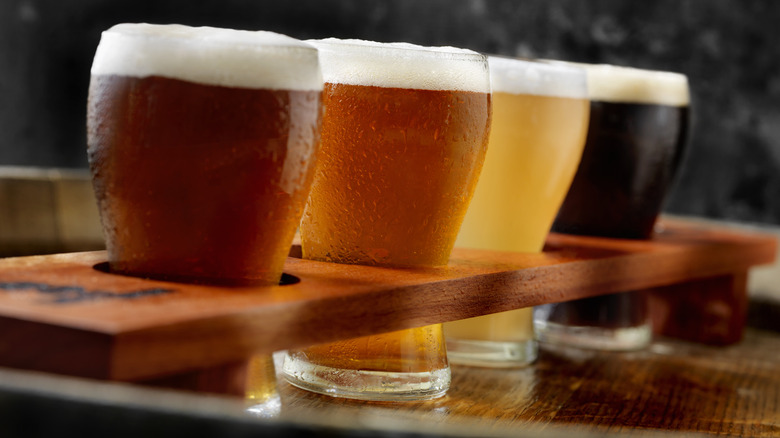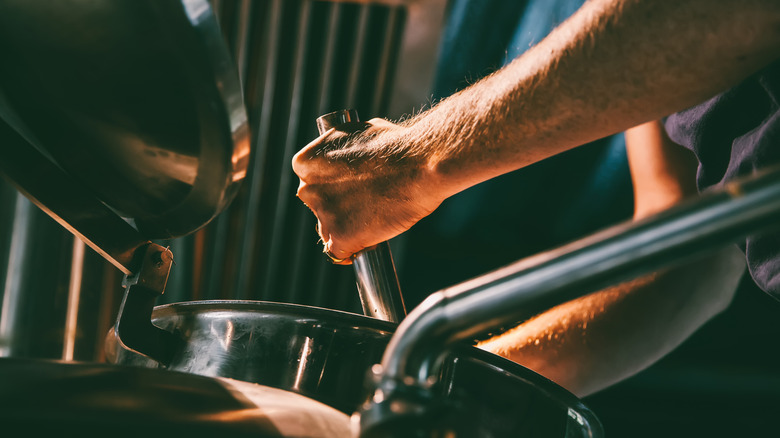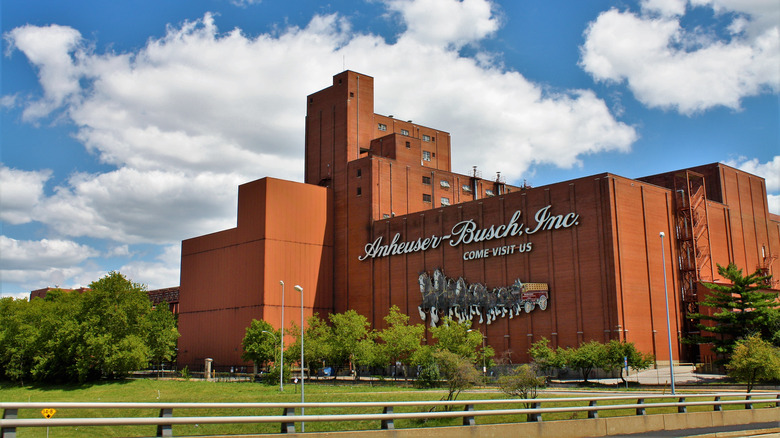Your Favorite Craft Beer Might Just Be From A Certain Brewery Giant
People seem to love the idea of small-scale operations, particularly local ones, that involve a crew of dedicated enthusiasts who put their very souls into what they are making. They like handing their dollars over to the underdog, so to speak, where funds go right back into the business, as opposed to corporate tycoons. This certainly applies to beer enthusiasts and their feelings towards the craft beer industry. The word "craft" itself strikes the same chord as terms like small batch, artisanal, boutique, and homegrown; they make a product feel not-so-commercialized.
I hate to be the "beer-er" of bad news, but your favorite craft-brewed beer just might be owned by one of the big dogs after all. There are nearly 10,000 craft breweries in the United States, so acquisition by larger beer conglomerates is nearly inevitable. The reason this might be a concern for some is that, often, when huge corporations (with investors to satisfy) take ownership of smaller businesses, priorities become skewed. For example, will the quality and integrity of the beers still take precedence, or will more money and attention be given to marketing for sales growth? Overall, the concern is that big business could change the very product that customers initially became fans of. But every craft beer drinker has to be the judge of that.
What is craft beer anyway?
The Brewer's Association defines a craft brewery as one that is small and independent. By "small" it means a brewery cannot produce more than 6 million barrels of beer per year. That may not sound very small, but consider Coors Brewing Company which produces 20 million barrels every year in its Colorado-based brewery (it has many more around the world). Heineken produced an astonishing 186 million barrels in 2020. And in 2023, Anheuser-Busch InBev pumped out 136 million barrels of beer in South America alone, not to mention its other breweries in the U.S., Asia, and beyond. So, as you can see, 6 million barrels is a drop in the bucket.
Craft breweries must also be independently-owned. This is where things can get murky, because technically the rule is that a craft beer producer can have multiple owners, and an owner can be a major beer company so long as it owns less than 25% of the business. In a case where another beer company wants to own 25% or more of the craft brewery, it must itself be a craft brewer.
Additionally, craft brewers typically abide by certain standards, although they don't have to for their beer to be considered "craft." They use historic brewing techniques and traditional beer-making ingredients, but generally like to innovate as well. It's not unusual to play with different flavors and create new styles of beers that the brewers believe will resonate with their clientele.
Who's actually making your favorite craft beer?
St. Louis-based Anheuser-Busch InBev is, of course, the producer of some of the most recognized beer names in the world, like Bud Light, Budweiser, Michelob Ultra, and Stella Artois. But its craft beer subsidiaries include Goose Island Beer Co., Devil's Backbone, Four Peaks, and Golden Road.
Molson Coors makes an enormous number of beer brands, including all of its Coors line, Sol Cerveza, Miller, Fosters, and Blue Moon. Some of the craft beers it owns are Revolver Brewing, AC Golden, and Hop Valley Brewing.
Dutch company Heineken is also one of the largest beer companies in the world, producing 250 beer labels in several countries. Its craft beers include Red Stripe, Lagunitas Brewing Company, and La Cibeles.
There are hundreds of craft breweries owned by large beer corporations. Finding out if your favorite is one of them shouldn't be difficult, if you even care to know. For anyone who really wants to support their own community, consider any small-scale breweries that are located close to home. These establishments are often very friendly to visitors, operating tasting rooms that sometimes feature things like live music and food trucks. The proprietors will appreciate your business just as much as you appreciate a great beer.


